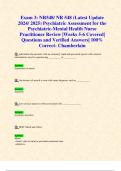Exam 3: NR54 8/ NR 54 8 (Latest Update 2024/ 2025) Psychiatric Assessment for the Psychiatric -Mental Health Nurse Practitioner Review |Weeks 5-6 Covered| Questions and Verified Answers| 100% Correct - Chamberlain Q: individual who presents with an extremely rapid and pressured speech with constant interruptions may be experiencing __________ or __________ Answer: hypomania or mania Q: An absence of speech is seen with some diagnoses such as ___________ Answer: dementia Q: non-sensical speech is often associated with _______________ Answer: psychotic disorders Q: MSE: Mood and Affect Answer: Mood -client's state of mind or prevalent emotional state -subjective -typically self -reported -Stable: mood is appropriate to their current situation -other: bright, happy, angry, agitated, irritable, labile, anxious, depressed, or euphoric Affect -physical manifestation of the client's emotional state as observed by the provider -normal, blunted, flat, bizarre, dysphoric, or euphoric -Qualities of affect • stability (stable or labile) • appropriateness • range (does it change with diff. situations) • intensity Q: MSE: Thought Process Answer: -rate of thoughts and how they flow and are connected -coherent vs. incoherent -Normal: linear & goal -directed -Other: loose, circumstantial, or tangential -Clients may experience flight of ideas with little connection between thoughts or words -Assessment: questioning client, listening to responses Q: MSE: Suicidal and Homicidal Ideation Answer: -Direct terms should be used to assess suicide preoccupation and planning -assess for homicidal ideation, intent, attempts, and plans -critical to determine whether a plan exists • access to the resources needed to execute the plan • more detailed and thorough the plan, the higher the risk • assess if plan is composed of fleeting thoughts rather than action steps • assess whether the client is angry and lashing out or intending to bring actual harm -SCREENING FOR SUICIDAL AND HOMICIDAL IDEATIONS IS AN ETHICAL OBLIGATION OF THE PMHNP & IS ESSENTIAL FOR PROTECTING ONESELF, THE CLIENT, & THE PUBLIC Q: MSE: Cognitive Assessment Answer: -evaluation of a client's level of awareness, attention, concentration, and memory -Awareness: observation with emphasis on the client's eyes and speech -alertness or wakefulness provides information about cognitive function • help rule out potential substance use or intoxication -levels of awareness: alert and oriented, somnolent, drowsy, or even comatose -Attention and concentration: observation of responses during the interview • can they stay on topic? • able to focus and respond to Q's? • can use standardized tools such as the Mini -Mental State Exam (MMSE), digit span test and the SSST -Memory assessment: immediate recall, short -term, and long -term memory • particularly important when ruling out dementia or Alzheimer's disease • Stress, anxiety, and depression can also impact memory • orientation, three -object recall -Mini -Cog exam is commonly used to help rule out significant cognitive issues Q: Two attention and concentration assessments Answer: digit span test -patient is given 5 -7 numbers & asked to repeat them forward and backward SSST -pt asked to subtract 7 from 100 and to continue counting back by 7s until told to stop *research studies have not endorsed them -SSST given to 132 normal adults, only 42% with errorless performance -325 hospitalized psychiatric pts given SSST, no diff. in performance from 50 healthy control subjects -Digit span test among 60 elderly pts with memory impairment and 44 elderly who were healthy found no difference Q: MMSE Answer:




